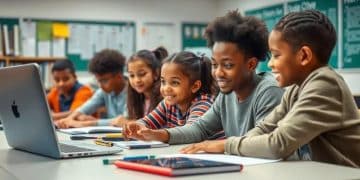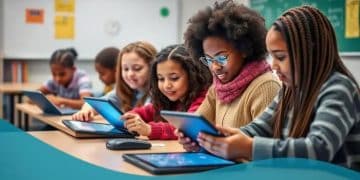Curriculum changes that will transform education today

Curriculum changes significantly enhance student learning by increasing engagement, fostering critical skills, and providing inclusive educational experiences relevant to modern challenges.
Curriculum changes are not just trends; they represent a vital shift in education that affects us all. Have you noticed how these changes can reshape learning experiences and better prepare our young minds for future challenges? Let’s explore this together!
Understanding the need for curriculum changes
Understanding the need for curriculum changes is essential in today’s rapidly evolving educational landscape. With the world moving so quickly, it’s crucial that our education systems adapt. Change ensures that students are not only informed but also prepared for future challenges.
Why Change is Necessary
Curriculum changes help address new knowledge and skills required in various fields. As technology advances, old methods may become outdated. Therefore, revisions are vital to keep learning relevant and effective.
- Incorporates modern skills like critical thinking.
- Addresses diverse learning styles among students.
- Increases engagement and motivation.
- Prepares students for real-world challenges.
Moreover, with society evolving, students must learn to collaborate and think innovatively. Curriculum changes support these skills by emphasizing teamwork and problem-solving. Integrating these elements leads to a richer learning experience.
Responding to Global Challenges
The world faces numerous challenges, from climate change to technological disruptions. Adapting the curriculum ensures students can confront these issues effectively. Education must go beyond textbooks; it should foster a mindset geared toward solutions and adaptability.
This adaptation also promotes inclusivity, allowing diverse voices and perspectives within the classroom. students learn to appreciate different cultures while developing empathy and understanding, which are essential in our globalized world.
Curriculum changes are not just upgrades; they’re necessary for a robust educational experience. They prepare students, not just academically, but as well-rounded individuals ready to face the world.
Key areas of focus in modern curricula

Key areas of focus in modern curricula are evolving to meet the needs of today’s students. Educators are now emphasizing skills that prepare learners for the real world. It’s essential that these areas address both academic and practical knowledge, ensuring students thrive in various environments.
Technology Integration
One major focus is the integration of technology in learning. Students must be comfortable with tools that enhance learning. This includes using:
- Online platforms for collaborative projects.
- Software applications that promote creativity.
- Data analysis tools for critical thinking.
- Simulation software to understand real-world scenarios.
By incorporating technology, students become proficient in essential skills for future job markets. They learn not just to use technology, but to leverage it effectively.
Social-Emotional Learning
Another vital area is social-emotional learning (SEL). This focus helps students develop self-awareness, management strategies, and interpersonal skills. Educators aim to enhance:
- Empathy and understanding among peers.
- Conflict resolution skills.
- Stress management techniques.
- Positive relationship building.
SEL prepares students to face life’s challenges, fostering resilience and emotional intelligence. Such skills are invaluable beyond the classroom.
Cultural competency is also being prioritized. Modern curricula strive to include diverse perspectives, allowing students to appreciate various backgrounds and experiences. Understanding cultural differences helps students foster inclusivity and respect.
Finally, critical thinking and problem-solving are at the heart of new curricula. Students are encouraged to ask questions, analyze data, and form logical conclusions. This approach nurtures innovation and independent thinking which is crucial in today’s complex world.
Challenges faced during curriculum updates
Challenges faced during curriculum updates can significantly impact the effectiveness of educational reforms. These updates are necessary for growth but can be met with resistance or obstacles. Understanding these challenges is vital for creating a successful transition.
Resistance to Change
One of the main hurdles in updating curricula is resistance from educators and stakeholders. Teachers may feel comfortable with traditional methods and hesitate to adopt new strategies. This resistance can stem from:
- Fear of the unknown and its effect on their teaching style.
- Concerns about the effectiveness of new materials.
- Training inadequacies on new techniques.
- Time constraints that limit the adoption of new practices.
When these concerns are acknowledged, solutions can be fostered to encourage buy-in from all parties.
Lack of Resources
Another significant challenge is the lack of adequate resources. This includes funding for new materials, technology, and professional development. Educators often struggle to implement changes without:
- Access to updated textbooks and learning materials.
- Technological tools that aid learning.
- Time set aside for training on new curriculum elements.
- Support from administration and parents.
Without these resources, the implementation process can be slow and ineffective.
Periodic assessments and feedback can also be difficult to manage amid curriculum changes. Ensuring that the curriculum meets student needs requires ongoing evaluation. However, educators may struggle to find the time or methods to gather this feedback effectively.
Additionally, ensuring consistency across different classrooms and schools can pose a challenge. Variability in how updates are implemented can lead to gaps in student learning. Collaboration among teachers is crucial for a unified approach to new curricula.
The impact of curriculum changes on student learning

The impact of curriculum changes on student learning can be profound. These changes often lead to improved engagement, better understanding, and enhanced skills. By updating what is taught and how it’s taught, educators can better prepare students for the future.
Increased Engagement
One major outcome of curriculum updates is increased student engagement. When curricula reflect modern issues and interests, students are more likely to participate actively. Engaging topics can stir curiosity and make lessons more enjoyable. This interest helps students develop a love for learning.
- Curriculum that includes real-world applications.
- Incorporation of technology and interactive lessons.
- Opportunities for project-based learning.
- Focus on student interests and community relevance.
These elements can transform a dull lesson into an exciting challenge that motivates students to excel.
Enhanced Skills Development
Additionally, curriculum changes often emphasize critical thinking and problem-solving. Students learn to analyze situations and come up with creative solutions. This skill is essential in a world that increasingly relies on innovation.
As students engage with updated materials, they gain essential skills needed for future careers. This includes communication skills, teamwork, and adaptability. These competencies are better aligned with today’s job market, preparing students for success.
Moreover, when students feel that their education is relevant, they are more likely to retain information. Updated content allows learners to connect new knowledge with their prior experiences, creating personal relevance that aids memory.
Furthermore, inclusive curricula that address diverse backgrounds can enhance a student’s sense of belonging. When students see their cultures and experiences reflected in their education, they are more inclined to succeed academically.
In summary, the impact of curriculum changes on student learning is significant. Updating curricula not only enhances engagement but also promotes skills that are crucial for life beyond school.
In conclusion, the impact of curriculum changes on student learning is significant and far-reaching. By engaging students through relevant materials and teaching methods, we foster a love for learning that lasts a lifetime. These updates not only enhance skills but also ensure that students are prepared for real-world challenges. Furthermore, inclusive and diverse curricula create a supportive environment where every student can find success. As education continues to evolve, embracing these changes is essential for preparing future generations.
FAQ – Frequently Asked Questions about Curriculum Changes and Student Learning
What are the main benefits of curriculum changes?
Curriculum changes lead to increased student engagement, enhanced skill development, and a more inclusive learning environment.
How do curriculum updates impact student performance?
By making learning more relevant and interesting, curriculum updates help improve student retention and performance.
What role does technology play in modern curricula?
Technology integration in curricula allows for interactive learning experiences and helps students adapt to the digital world.
How can educators address resistance to curriculum changes?
Educators can address resistance by involving stakeholders in the update process and providing adequate training and support.






